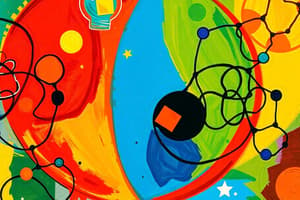Podcast
Questions and Answers
Which of the following is NOT a major branch of science?
Which of the following is NOT a major branch of science?
- Physics
- Geology
- Biology
- Psychology (correct)
What is the first step of the scientific method?
What is the first step of the scientific method?
- Observation (correct)
- Analysis
- Hypothesis
- Experiment
Which statement accurately describes a scientific theory?
Which statement accurately describes a scientific theory?
- It is a temporary guess awaiting validation.
- It is an untestable idea.
- It is a law that is universally accepted.
- It is a well-substantiated explanation supported by evidence. (correct)
What is an essential component of scientific reasoning?
What is an essential component of scientific reasoning?
Which method is primarily used for scientists to validate their research?
Which method is primarily used for scientists to validate their research?
What is scientific literacy primarily concerned with?
What is scientific literacy primarily concerned with?
Which of the following best describes 'force' in a scientific context?
Which of the following best describes 'force' in a scientific context?
How does scientific literacy impact daily life?
How does scientific literacy impact daily life?
In science, what is gravity?
In science, what is gravity?
Which of the following statements about matter is true?
Which of the following statements about matter is true?
Flashcards
What is matter?
What is matter?
Anything that occupies space and has mass. It can be solid, liquid, or gas.
What is energy?
What is energy?
The ability to do work. It can transform or transfer, but cannot be created or destroyed.
What is force?
What is force?
A push or pull that can change an object's motion.
What is motion?
What is motion?
Signup and view all the flashcards
What is gravity?
What is gravity?
Signup and view all the flashcards
What is the scientific method?
What is the scientific method?
Signup and view all the flashcards
What is a scientific theory?
What is a scientific theory?
Signup and view all the flashcards
What are scientific laws?
What are scientific laws?
Signup and view all the flashcards
What is scientific reasoning?
What is scientific reasoning?
Signup and view all the flashcards
How do scientists communicate their findings?
How do scientists communicate their findings?
Signup and view all the flashcards
Study Notes
Branches of Science
- Science is a systematic enterprise that builds and organizes knowledge in the form of testable explanations and predictions about the universe.
- Science is characterized by observation, experimentation, and the formulation of hypotheses and theories.
- Major branches include:
- Physical sciences: physics, chemistry, astronomy.
- Life sciences: biology, zoology, botany.
- Earth sciences: geology, oceanography, meteorology.
- Interdisciplinary fields of study combine elements from different branches.
Scientific Method
- The scientific method is a systematic approach for acquiring knowledge.
- Key steps:
- Observation: noticing a phenomenon or problem.
- Question: formulating a question about the observation.
- Hypothesis: proposing a possible explanation for the question (a testable statement).
- Prediction: stating the expected outcome if the hypothesis is correct.
- Experiment: conducting a controlled test to gather data.
- Analysis: examining the data to see if it supports or rejects the hypothesis.
- Conclusion: drawing conclusions based on the analysis.
Scientific Theories and Laws
- A scientific theory is a well-substantiated explanation of some aspect of the natural world. Theories are supported by a vast body of evidence.
- Scientific laws describe fundamental relationships in nature. Laws are often expressed as mathematical equations.
- Theories and laws are not absolute truths; they are subject to revision as new evidence emerges.
Scientific Reasoning and Critical Thinking
- Critical thinking involves analyzing information objectively and evaluating its validity.
- Scientific reasoning involves using evidence to reach conclusions.
- Key aspects:
- Skepticism: questioning claims and demanding evidence.
- Objectivity: avoiding biases and focusing on the facts.
- Logic: drawing conclusions in a reasoned manner.
- These skills are essential for evaluating scientific claims and understanding scientific research.
Scientific Communication
- Scientists communicate their findings through various channels, including:
- Peer-reviewed journals: allowing other scientists to scrutinize and validate research.
- Conferences and presentations: sharing research with a broader scientific audience.
- Books and popular science articles: conveying scientific knowledge to a wider public.
- These methods ensure the rigor and transparency of scientific work.
- Effective scientific communication is crucial for knowledge sharing and the advancement of scientific understanding.
Major Scientific Concepts
- Many fundamental concepts underpin the fields of science, including:
- Matter: anything that occupies space and has mass.
- Energy: the capacity to do work.
- Force: pushes or pulls that can change the state of motion of an object.
- Motion: the change of position of an object over time.
- Gravity: the force of attraction between any two objects with mass.
Importance of Scientific Literacy
- Scientific literacy is the ability to understand and apply scientific knowledge and processes.
- It's essential for: - Making informed decisions about scientific issues. - Evaluating scientific claims in the media and daily life. - Participating in discussions about science and technology.
- It contributes to a more well-rounded perspective on daily life.
Studying That Suits You
Use AI to generate personalized quizzes and flashcards to suit your learning preferences.




